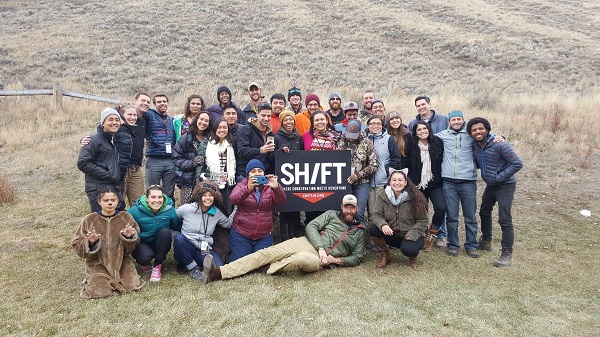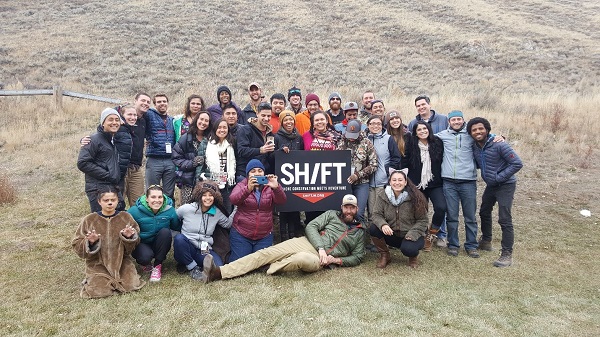
It’s not often that we as educators, faculty, and staff find our perspectives challenged by participants. As a place-based educational organization, we exist in a privileged and rosy-colored bubble; from this place of privilege, we take a look at the world around us and explore how we can best share the science, wonder, beauty, and magic of the Greater Yellowstone Ecosystem with our participants. Through our focus on place-based education, student-centered learning, and life-changing experiences, we have the honor of sharing this wonderful landscape with thousands of participants every single year. This in itself is a very good thing, and this is where TSS truly shines.
However, every so often, a program comes along that forces us to take a deeper look into who we are as an organization and what our potential could be.
Last week, Teton Science Schools hosted the Emerging Leaders Program (ELP), an offshoot of the larger SHIFT festival. SHIFT, which stands for Shape How We Invest in Tomorrow, is a conference aimed at examining the intersection between conservation and adventure by inviting experts, enthusiasts, and explorers from multiple perspectives to engage in meaningful dialogue on how we can all work together for a better ecological future.
The ELP program aims to bring together a diverse cohort of current leaders in the conservation world. Through storytelling, case-studies of public land management, and project-based learning, they share their expert knowledge with each other. This sharing creates a stronger cohort of current leaders, more capable of going into the world and using their collective knowledge and strength to make the differences that need to be made.
Through virtue of coming from places other than the bubble of Jackson, these emerging leaders address the issues that truly matter to the vast majority of our population. Where we might see the Bear’s Ears National Monument controversy, they see the issues with unclean drinking water in the communities surrounding Bear’s Ears. Where we question proposed park service fee increases, they ask why there aren’t more people of color working in those parks. Where we feel the need to preserve and protect our underfunded, neglected and exploited public lands, they feel the need to preserve and protect our underfunded, neglected and exploited human communities. This is not to say they don’t also support public lands, conservation efforts, and the hope for a more ecologically supportive society. The power these leaders bring to the conversation, through the ELP program, is the inclusion of perspectives that often go overlooked in the current conservation world.
For a week, from a pre-conference program hosted by TSS to the conclusion of the SHIFT conference, these participants shared their unique and powerful expertise and perspectives with TSS staff. As we explored current land management issues and potential solutions together, these leaders ultimately forced me and many others to rethink how we do what we do. In the words of one TSS staff member,”…it is honestly easy to forget some of the inequality problems that exist outside of our bubble when we are not faced with them daily in the workplace. I am inspired to keep this conversation going …[and to be] a more active ally for those in our local community who need one … and [I] feel empowered to ask the hard but important questions that make everyone uncomfortable.”
Personally, after spending just one week with these ELP’ers, I can confidently say that I have ended with more questions about my role than I started with. I will continue to support the amazing things we do in and for our community because I believe in this work. But I have now been challenged to take a deeper look at those whose voices have been left out of the conversations, both within and outside our organization. I have been challenged to strive for a more equitable and inclusive future. As one conference participant said, “We all need a little more JEDI training. You know, Justice, Equity, Diversity and Inclusivity.”
As we celebrate our 50 years at TSS and the impact we have had on so many participants, I am excited to imagine who else will benefit from what we have to offer in the 50 years to come as we continually re-examine who we serve and how we do it.


